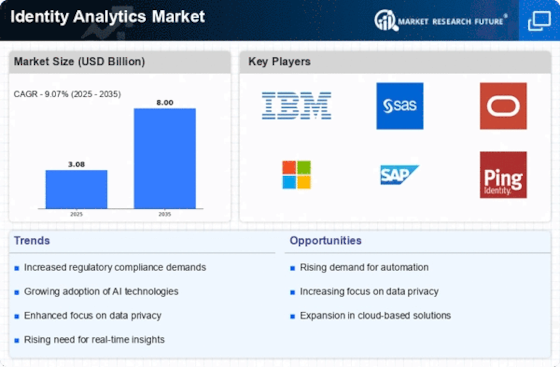Market Trends
Key Emerging Trends in the Identity Analytics Market
The Identity Analytics market has been witnessing significant trends that are reshaping the landscape of digital identity management. As businesses navigate an increasingly complex cybersecurity landscape, the demand for advanced identity analytics solutions has surged. One notable trend is the growing emphasis on adaptive authentication. Organizations are moving away from traditional static methods and adopting adaptive approaches that dynamically assess user behavior and context to determine the level of authentication required. This shift is driven by the need to enhance security without compromising user experience.
Another prominent trend in the Identity Analytics market is the rise of cloud-based identity and access management (IAM) solutions. With the proliferation of remote work and the widespread adoption of cloud technologies, businesses are recognizing the importance of flexible and scalable IAM solutions. Cloud-based identity analytics provide organizations with the agility to manage identities and access controls across diverse environments, enabling seamless and secure user experiences. This trend aligns with the broader industry move towards cloud-native solutions and reflects the evolving nature of modern work dynamics.
The integration of artificial intelligence (AI) and machine learning (ML) into identity analytics solutions is also gaining momentum. These technologies empower organizations to detect and respond to identity-related threats in real-time by analyzing vast amounts of data and identifying anomalous patterns. AI-driven identity analytics not only enhance security but also contribute to the overall efficiency of identity management processes. Organizations are increasingly recognizing the value of proactive threat detection and prevention through the application of AI and ML in the identity analytics space.
Moreover, regulatory compliance is exerting a significant influence on the Identity Analytics market. As data protection regulations become more stringent, organizations are under increasing pressure to ensure compliance with privacy and security standards. Identity analytics solutions that offer robust auditing and reporting capabilities are in high demand, helping businesses demonstrate adherence to regulatory requirements and mitigate the risk of non-compliance.
In response to the evolving threat landscape, identity analytics vendors are focusing on continuous innovation. The development of advanced features such as behavioral biometrics, risk-based authentication, and identity scoring reflects the industry's commitment to staying ahead of emerging cyber threats. These innovations contribute to the creation of a more robust and adaptive security posture, aligning with the dynamic nature of contemporary cybersecurity challenges.
Furthermore, the Identity Analytics market is witnessing a shift towards user-centric approaches. As organizations recognize the importance of user experience in driving adoption and compliance, there is an increased focus on solutions that prioritize a frictionless and user-friendly authentication experience. This trend is particularly relevant as businesses seek to strike a balance between security and user convenience, aiming to create an environment where users can seamlessly and securely access the resources they need.
In conclusion, the Identity Analytics market is undergoing dynamic transformations driven by technological advancements, regulatory pressures, and evolving user expectations. The adoption of adaptive authentication, cloud-based solutions, AI and ML integration, regulatory compliance, continuous innovation, and a user-centric approach are key trends shaping the future of identity analytics. As organizations grapple with the challenges of securing digital identities in an interconnected world, staying abreast of these market trends is crucial for making informed decisions and maintaining a resilient cybersecurity posture.


















Leave a Comment